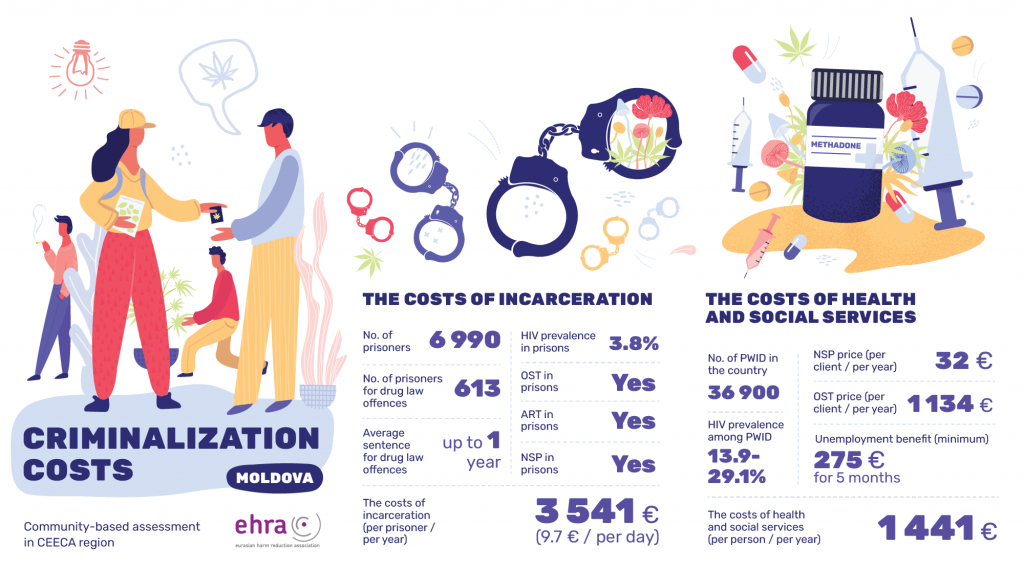There were 6,990 prisoners in Moldova in 2019, of which 613 were incarcerated for drug law offences [1]. Possession of a small quantity of drugs is considered an administrative offence in Moldova, punishable by a fine of €30 – €75; possession of large quantities is a criminal offence, punishable by a fine of €1,000 – €1,750 or community work of up to 150 hours or 1 year imprisonment; possession of a very large quantity of drugs is also a criminal offence but is punishable from 1 to up to 6 years imprisonment [2], [3]. HIV prevalence among prisoners was estimated in 2017 at 3.8% [4] and antiretroviral therapy (ART) is available, as is opioid substitution therapy (OST) and needle/syringe programmes (NSP) in prisons [5].
The Government of Moldova spends €3,541 on each prisoner, per year, or €9.70 per day [6].
As of 2019, there were estimated to be 36,900 people who inject drugs in Moldova [7] with a HIV prevalence ranging between 13.9% and 29.1% [8]. NSP costs around €32 per client, per year, and OST costs about €1,134 per client, per year [9]. Unemployment benefit is paid at the rate of €55.16 per person, per month, for a period of 5months, i.e. a total payment of €275, based on 40% of the national minimum wage [10].
Therefore, it could cost the Government of Moldova €1,441 to support each person who injects opioid drugs in community settings, whereas the Government has to pay €3,541 for such a person to be imprisoned. Consequently, the Government of Moldova could save €2,098 per drug user, per year, by decriminalising drug use and possession; based on the number of people incarcerated for such offences, the Government could save up to €1.3 million in total per year.
[1] Aebi MF, Tiago MM. SPACE I – 2019 – Council of Europe Annual Penal Statistics: Prison populations. Strasbourg; Council of Europe, 2020. https://wp.unil.ch/space/files/2021/02/200405_FinalReport_SPACE_I_2019.pdf (accessed 4 August 2021).
[2] Eurasian Harm Reduction Association (EHRA). Penalties for drug law offences in East Europe and Central Asia at a glance. Vilnius; EHRA, 2017. https://old.harmreductioneurasia.org/drug-laws/#Possession (accessed 7 August 2021).
[3] The Criminal Code of the Republic Of Moldova. Chisinau; Official Monitor No. 72-74/195, 14 April 2009. https://sherloc.unodc.org/cld/uploads/res/document/criminal-code-of-the-republic-of-moldova_html/Republic_of_Moldova_Criminal_Code.pdf (accessed 9 August 2021).
[4] Joint United Nations Programme on HIV and AIDS (UNAIDS). The Key Populations Atlas. Geneva; UNAIDS. https://kpatlas.unaids.org/dashboard (accessed 3 August 2021).
[5] Harm Reduction International (HRI). Global State of Harm Reduction 2020, Regional Overview 2.2 Eurasia. London; HRI, 2021. https://www.hri.global/files/2020/10/26/Global_State_HRI_2020_2_2_Eurasia_FA_WEB.pdf (accessed 3 August 2021).
[6] Aebi M F, Tiago MM. SPACE I – 2020 – Council of Europe Annual Penal Statistics: Prison populations. Strasbourg; Council of Europe, 2021. https://wp.unil.ch/space/files/2021/04/210330_FinalReport_SPACE_I_2020.pdf (accessed 3 August 2021).
[7] Parsons D, Burrows D, Falkenberry H, McCallum L. Regional Analysis: Assessment of HIV Service Packages for Key Populations in Selected Countries in Eastern Europe and Central Asia. Washington DC; APMG Health, April 2019.
[8] Joint United Nations Programme on HIV and AIDS (UNAIDS). Country progress report – Republic of Moldova. Global AIDS Monitoring 2019. Geneva; UNAIDS, 2019. https://www.unaids.org/sites/default/files/country/documents/MDA_2019_countryreport.pdf (accessed 9 August 2021).
[9] Information submitted by national partners.
[10] National Social Insurance House of the Republic of Moldova (NKSS). Unemployment benefit. Chisinau; NKSS, 2021. http://cnas.md/tabview.php?l=ru&idc=656&t=/drugie-cotialinie-viplati/pomosi/pocobie-po-bezrabotite/viplata-pocobiea/ (accessed 9 August 2021).

